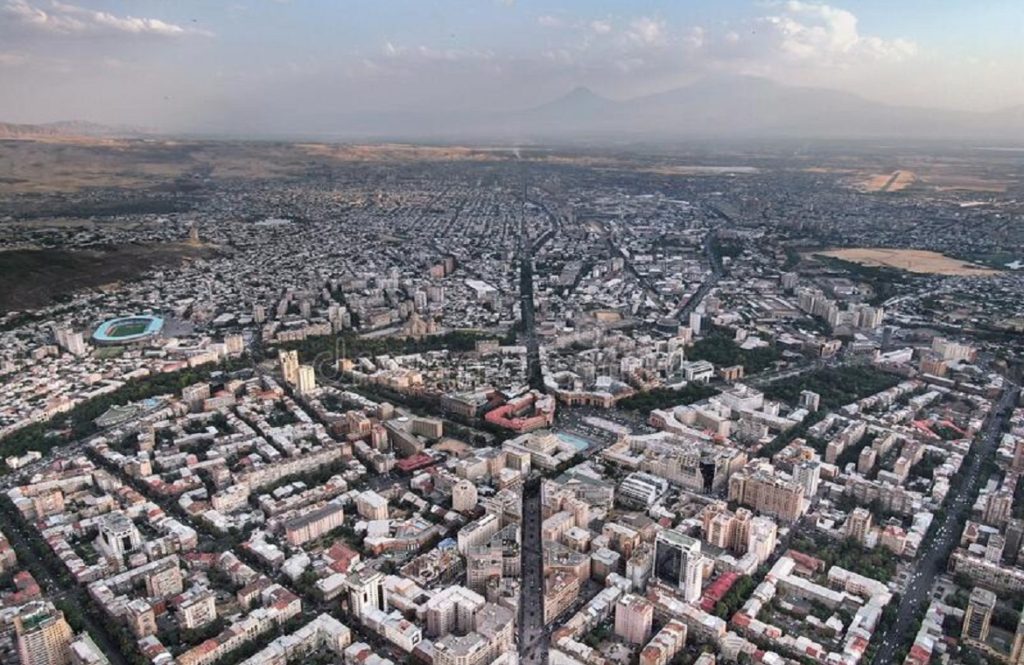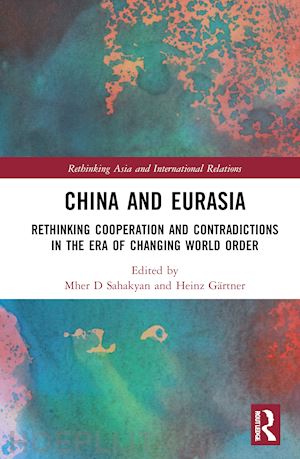World Geostrategic Insights interview with Dr. Mher Sahakyan on the impact of the war in Ukraine on the Caucasus, the role of the European Union, Russia, and Iran in the region, and China’s pivot to Eurasia.

Dr. Mher Sahakyan is the founder and director of the China-Eurasia Council for Political and Strategic Research, Armenia, and AsiaGlobal Fellow at Asia Global Institute, University of Hong Kong.
– The war in Ukraine has raised concerns about the outbreak of possible new military clashes in South Ossetia and Nagorno-Karabakh. What is your opinion? Do you think there are really concrete conditions and risks for new wars in the Caucasus?
I will separate from each other South Ossetian, Abkhazian, and Nagorno-Karabakh issues. The Georgian government implements pragmatic foreign policy. It understands that any kind of clashes in Abkhazia and South Ossetia will not add any value to Georgian economy and stability. Therefore, Georgia has not joined anti-Russian sanctions and it trades with Russia as usual, also provides a transit corridor to Russia for its trade with Armenia, Turkey and other states located south from Georgia. Therefore, I do not see any possible clashes between Russia and Georgia in the near future.
The Ukrainian war is also a good lesson for other middle and small states, that if they go to war against Russia, NATO will not send its troops to help them. Situation in Nagorno-Karabakh is very difficult, it depends on Russia’s advancement in Ukraine. If Russia stands weaker because of the Russo-Ukraine war, in 2025 it is possible that Azerbaijan will demand that Russia withdraw its peacekeepers from Nagorno-Karabakh. It can bring new hostilities and even provoke a new war between Armenians of Nagorno-Karabakh and Azerbaijan.
In this scenario Armenia will back Nagorno-Karabakh and Turkey will support Azerbaijan. This kind of development can stand as a reason for direct clashes between Armenia and Azeri-Turkish tandem. Russia will have to back its military ally-Armenia, which can stand a proxy or direct war between Russia and Turkey in South Caucasus. For this reason, Armenia and Azerbaijan must try to solve their contradictions and find ways for modus vivendi, open transportation routes, reestablish economic relations and build peace. Armenia, Georgia and Azerbaijan must avoid the “Ukrainization” of the South Caucasus, where the interest of Great powers can collide again, which will ruin the entire South Caucasus.
– Although the South Caucasus region has traditionally been in Russia’s geopolitical orbit, it is now the European Union that seems to be playing a main role in peace talks, border demarcation, and reopening transportation links between Azerbaijan and Armenia. In your opinion, can the EU take a leading role in this area and replace Russia? Or could Russia and the EU cooperate as mediators in the South Caucasus, despite their stormy relations following the Russian military attack on Ukraine?
Yes, there is some involvement from the side of the EU. It is positive to see that Brussels tries to play a constructive role for solving Armenian-Azerbaijani conflict and it implements efforts for reopening transportation links, which will play a positive role not only for the economies of regional states but also for the World’s economy. But there is a need to mention that Russia plays the main role, as it was the power which could find ways for stopping the war in 2020 and it is the power which sent its troops to the region for peacekeeping. Therefore, there is no need to underestimate or overestimate the roles of Moscow and Brussels, both play an important and constructive role. However, it will be better if Brussels contributes to the work of activation of the Minsk group as well. In this format collective West and Russia can continue their work together and find ways for a peaceful solution of the Karabakh issue.
– In recent months, Iran has engaged in an active foreign policy in the South Caucasus to push forward its geopolitical and geo-economic interests. Among other things, Iran (together with India) is pushing Armenia to take decisive actions in the implementation of the North-South transportation project. In your opinion, what are the cards Iran can play in the South Caucasus? Can Iran’s engagement be beneficial to the countries in the region?
Iran is not an influential player in the South Caucasus, if I compare it with Russia, the EU, US, China and Turkey. For instance, it does not have vast investments in the South Caucasus. During the war in Karabakh it supported Azerbaijan and afterwards congratulated Baku. For this reason, in Armenia Tehran lost its influence which it could create by the help of soft power policy. People are questioning why Iran backed Azerbaijan.
Tehran and Baku do not trust each other as well, as Azerbaijan has political and military close cooperation with Israel, which is the main adversary of Iran in the Middle East. Iran has some leverage on Azerbaijan, as it provides a corridor for Azerbaijan that keeps contact with the Nakhchivan Autonomous Republic. Therefore, I do believe that Iran is not interested to see the reconnection of Armenian and Azerbaijani transportation infrastructure, as Baku will be able to contact Nakhichevan through the territory of Armenia.
Iran has minimal political and economic relations with Georgia, as Tbilisi is the main strategic partner of the US. Actually, the UNSC sanctions before, and after the 2018 US unilateral sanctions on Iran, limit cooperation prospects between Iran and South Caucasian states.
Actually, the following routes of the International North-South Transport Corridor operate now: the maritime route from Russia’s St. Petersburg to the Persian Gulf region and India’s ports. The Caspian route, which connects with each other Iranian and Russian ports. The Eastern Route, which links railways of Iran, Central Asia and Russia with each other. It is the most advanced direction. The next mainland route, which is called Western, goes through Azerbaijan. Russia and Iran mostly use this route for the transportation with tracks.
You are right that there are some positive messages for Armenia from New Delhi, as Armenia is also an official member of the International North South Transport Corridor, but first Armenia needs to finish building its north-South Transport Road, which aims to connect ports located in the Persian Gulf with Georgian ports in Black Sea. However, if Armenia and Azerbaijan re-connect their railways, Armenian railways will play a role in India-Persian Gulf-Iran-Nakhichevan (Azerbaijan)-Armenia-Georgia-Black Sea direction.
– You co-edited a book titled “China and Eurasia Rethinking Cooperation and Contradictions in the Era of Changing World Order.” What do you think are the main challenges and prospects in China-Eurasia relations?
Yes, you are right in 2021 Routledge published China and Eurasia Rethinking Cooperation and Contradictions in the Era of Changing World Order book, where international team of scholars from Austria, China, Russia, UAE, Montenegro, Georgia, India, Armenia introduced its findings on consequences of changing world order and China’s role. The book focuses on China’s pivot towards Eurasia, the Belt and Road initiative, the Shanghai Cooperation Organization, Beijing’s cooperation and contradictions with India, the EU, Western Balkans and South Caucasus states. It introduces the Sino-Russian struggle for multipolarity and multilateralism in Eurasian continent. It also investigates digitization processes in Eurasia, notably it researches China’s Silk Road and Digital Agenda of Eurasian Economic Union. This book also provides concrete recommendations for improving Eurasian political, economic security and stability.
Actually, the war in Ukraine settled the Multipolar World order 2.0, where China plays an important role. Through its Belt and Road initiative, and its sub directions, such as Silk Road Economic Corridor, 21st Maritime Silk Road, Digital Silk Road and Health Silk Road, Beijing spreads its economic influence, which brings it political influence as well. Eurasian young Superpower-China creates its economic-political pole, where pragmatic policy, investments, and benefit from trade plays the main role. It also spread its technologies in Eurasian continent for which it appeared under the heavy pressing of the collective West. However, it succeeded in finding markets for its technologies and innovations in the Middle East, South Caucasus, Russia, Belarus and some Eastern and Central European states.
Therefore, Cyberspace stands another challenge for Eurasian states and China, where competition between great powers creates security issues, however if states find ways for cooperation in this field it can bring prosperity and benefits to the entire humanity. The decision for the conjunction of Eurasian Economic Union with China’s Belt and Road Initiative creates good opportunities for Armenia, Belarus, Russia, Kazakhstan and Kyrgyzstan to strengthen their economic collaboration with the second economy of the world-China and get access to its innovations and technologies. It is true that there are some problems in the 16+1 Format, but it is still operational and provides a platform for finding ways for cooperation between China and Central and Eastern European states. Eurasian continent will benefit if the EU and China choose cooperation over competition, but current developments lead mostly towards competitions rather than cooperation.
For now, the main challenge for the entire Eurasia and China is war in Ukraine. I do believe that all Eurasian states are losing from it. It threatens transportation and trade between Europe and Asia through the Silk Road Economic Belt’s New Economic Land Bridge, which passes through Russia’s territory. The direct clash between Russia and NATO will be a total disaster for the entire continent. In turn, China will lose hundreds of billions of investments, which it had invested in the framework of the Belt and Road Initiative. Therefore, Beijing can play a proactive role and mediate between Moscow and Kiev for finding a diplomatic solution to end the war.
Dr. Mher Sahakyan – Director, China-Eurasia Council for Political and Strategic Research, Armenia.








